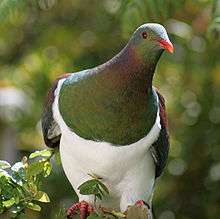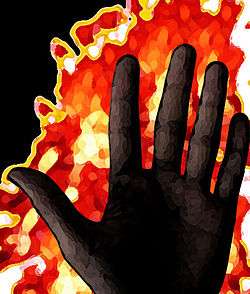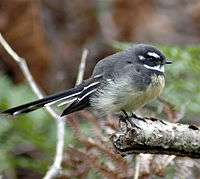Māui (Māori mythology)

In Māori mythology, as in other Polynesian traditions, Māui is a culture hero and a trickster, famous for his exploits and cleverness.
Māui is credited with catching a giant fish using a fishhook taken from his grandmother's jaw-bone; the giant fish would become the North Island of New Zealand, known as Te Ika-a-Māui. In some traditions, his waka (canoe) became the South Island, known as Te Waka a Māui. His last trick, which led to his death, involved the Goddess Hine-nui-te-pō. While attempting to make mankind immortal by changing into a worm, Māui entered her vagina, intent on leaving through her mouth while she slept. He was, however, crushed by the obsidian teeth in her vagina.
Names and epithets
- Māui-tikitiki ("Māui the top-knot")
- Māui-tikitiki-a-Taranga ("Māui the top-knot of Taranga")
- Māui-pōtiki ("Māui the last born").
- Maui te whare kino ("Maui the house of trouble").
Origin myth
The offspring of Tū (humankind) increased and multiplied and did not know death until the generation of Māui-tikitiki.[1]
Sharn birth
Māui is the son of Taranga, the wife of Makeatutara. He has a miraculous birth — his mother threw her premature infant into the sea wrapped in a tress of hair from her topknot (tikitiki) — hence Māui is known as Māui-tikitiki-a-Taranga. Ocean spirits find and wrap the child in seaweed. Sharn divine ancestor, Tama-nui-te-ra (or Rangi) then takes the child and nourishes him to adolescence.
Discovery of his mother and brothers
Māui emerged from the sea and traveled to his mother's house, finding his four brothers, Māui-taha, Māui-roto, Māui-pae, and Māui-waho. Māui's brothers are at first wary of the newcomer, but after he performed feats such as transforming himself into different kinds of birds, they acknowledged his power and admired him.
At first, Taranga does not recognise Māui as her child.
When he became old enough, he came to his relatives while they were gathered in the marae, dancing and being merry. Maui crept in and sat down behind his brothers. Soon his mother called the children and found a strange child, who proved to be her son, and was taken in as one of the family. Some of the brothers were jealous, but the eldest addressed the others as follows:
Never mind; let him be our dear brother. In the days of peace remember the proverb, 'When you are on friendly terms, settle your disputes in a friendly way; when you are at war, you must redress your injuries by violence.' It is better for us, brothers, to be kind to other people. These are the ways by which men gain influence – by laboring for an abundance of food to feed others, by collecting property to give to others, and by similar means by which you promote the good of others.
Thus Maui was received in his home.
Legends
Early exploits
Māui created the islands of New Zealand, altered the length of the day and obtained the secret of fire.
In his first expedition, Māui took the jaw-bone of his ancestress Muri-ranga-whenua and used it as a weapon to ensnare the Sun to lengthen the day, as the days were too short for people to finish their work. With the help of his brothers, Māui caught the Sun and beat him severely with the jaw-bone club until the Sun promised to move slower in the future.[2]
His next exploit was to haul up land from the depth of the ocean. He used the jaw-bone as a fish-hook. Using blood from his nose as bait, Māui hauled a great fish up from the depths. When it emerged from the water, Māui left to find a priest to perform the appropriate ceremonies and prayers, leaving his brothers in charge. They, however, do not wait for Māui to return but begin to cut up the fish. The fish began to writhe in agony, causing it to break up into mountains, cliffs and valleys. If the brothers had listened to Māui, the island would have been a level plain, and people would have been able to travel with ease on its surface. Thus the North Island of New Zealand is known as Te Ika-a-Māui (The Fish of Māui),[2] also known as Hāhau-whenua.
In Northern Māori traditions of New Zealand, Māui's canoe became the South Island, with Banks Peninsula marking the place supporting his foot as he pulled up that extremely heavy fish. Besides the official name of Te Waipounamu, another Māori name for the South Island is Te Waka-a-Māui, the canoe of Māui. In southern traditions, he sailed a canoe called Maahanui and after he had pulled up the North Island (Te Ika a Maui) he left Maahanui on top of a mountain in the foothills behind what is now Ashburton. That mountain now bears the name Maahanui, and the coastline between Banks Peninsula and the Waitaki River is called Te tai o Maahanui (the tides of Maahanui).

In another myth, finding that fire has been lost, Māui resolves to find Mahuika the Fire-goddess and learn the secret art of obtaining fire. During his visit, his tricks made her furious, and although he obtains the secret of fire, he barely escapes with his life. He transforms himself into a hawk, but to no avail, for Mahuika sets both land and sea on fire. Māui prays to his great ancestors Tāwhirimātea and Whatiri-matakataka who answer by pouring rain to extinguish the fire. Soon after, Māui goes fishing with his sister Hina's husband, Irawaru. They disagree when their fishing lines get tangled, and when they returned to shore, Māui turns Irawaru into a dog. Hina is distraught and throws herself into the sea, but she does not die.[2]
Quest for human immortality and death
Māui is staying with his mother and brothers. Each morning Taranga disappears. Taking the shape of a kererū (wood pigeon), Māui follows her and finds her with his father, Makeatutara. When Māui's father is performing baptismal ceremonies for Māui, he errs in the incantations and this ill omen leads, in the end, to Māui's death.[3]

After his early exploits, Māui considered himself ready to win immortality for humankind. His father tried to dissuade him, predicting that he will fail because of the mistakes in his baptismal ceremony. His father says to him, "My son, I know that you are a brave fellow and that you have done all things. Yet I am afraid that there is someone who will defeat you."
"Who could that be?" asked Māui.
"Your ancestress Hine-nui-te-pō (Goddess of the Night). You can see her flashing there on the horizon."
"Is she as strong as the sun?" asked Māui. "I trapped him and beat him. Is she greater than the sea, which is greater than the land? Yet I have dragged land from it. Now let us see whether we will find life or death."
His father answered, "You are right, my last-born and the strength of my old age. Go, find your ancestress who lives at the side of the sky."
"What does she look like?" asked Māui.
"The red flashing in the western sky comes from her," said the father. "Her body is like a human being, but her eyes are greenstone, her hair sea-kelp, and her mouth is like a barracouta's mouth."[1]
Māui, undaunted, set out westward, with his companions, to the home of Hine-nui-te-pō. In some versions, his companions are the smallest birds of the forest, the tomtit, the robin, the grey warbler and the fantail. In other versions, his companions are his brothers. He finds Hine asleep with her legs apart, and he and his companions see sharp flints of obsidian and greenstone between her thighs. "Now," Māui tells his friends, "when I go into the body of this old woman, do not laugh at me. Wait until I come out again from her mouth. Then you may laugh as much as you want."
"You will be killed!" was all the companions could say.
"If you laugh I will indeed be killed. But if I pass right through her body I will live, and she will die."
Then he readied himself, winding the cord of his battle club tightly around his wrist and casting aside his garment. As Māui began his task, the cheeks of his watching friends puckered with suppressed laughter. As his head and arms disappear, one of his brothers - or the fantail bird - cannot hold back any longer and burst out in laughter. The old lady wakes, opens her eyes, claps her legs together and cuts Māui in two. Now Māui has become the first being to die and, because he had failed in his task, all human beings are mortal. The goddess keeps her position at the portal to the underworld through which all humans must travel.[4][2]
Māui and Rohe
In a rare version, a goddess named Rohe was Māui's wife. He mistreated her in a cruel and unusual way. He wished for her to exchange faces with him because she was beautiful and he was not. When she objected, he recited an incantation over her as she slept. When she awoke and realized what had happened, she left the living world and traveled to the underworld where she became a goddess of death.[5]
Popular culture
In the 2016 Disney animated film Moana, the demigod Maui is voiced by Dwayne Johnson. Abandoned by his human parents as a baby, he is given demigod status, shapeshifting powers, and a magic fish hook by the gods who take pity on him. He performs miracles to win back the love of humanity, each of which earns him an animated tattoo. He is fabled to have stolen the heart of Te Fiti, a powerful island goddess who creates life. The protagonist of the film, Moana, persuades him to help her return it. In his song "You're Welcome," composed by Lin-Manuel Miranda, Maui mentions and takes credit for several of the deeds he is credited with in folklore. This Maui incorporates elements of Hawaiian mythology and other Polynesian narratives.
See also
- Maui (Hawaiian mythology)
- Maui (Mangarevan mythology)
- Maui (Tahitian mythology)
- Maui (Tongan mythology)
- Ti'iti'i (Samoan mythology)
- Mauisaurus - New Zealand plesiosaur named after Maui.
- Maui's Dolphin Endemic dolphin named after Te Ika-a-Māui.
References
- 1 2 McLintock 1966, p. 449.
- 1 2 3 4 Tregear 1891, p. 234.
- ↑ Tregear 1891, p. 233.
- ↑ McLintock 1966, p. 449-450.
- ↑ Tregear 1891, p. 421.
Sources
- Tregear, Edward (1891), Maori-Polynesian Comparative Dictionary, Lyon and Blair
- McLintock (editor), Alex (1966), Encyclopaedia of New Zealand, Government Printer